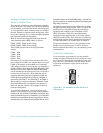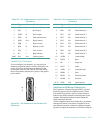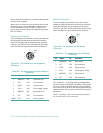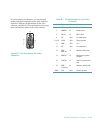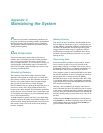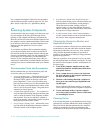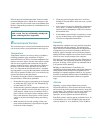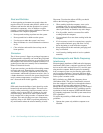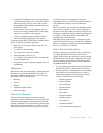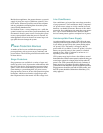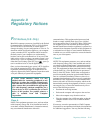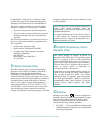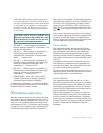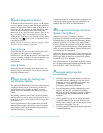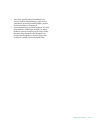
C-134 Dell PowerEdge 2100/180 and 2100/200 Systems User’s Guide
Dust and Particles
A clean operating environment can greatly reduce the
negative effects of dust and other particles, which act as
insulators and interfere with the operation of a system’s
mechanical components. Also, in addition to regular
cleaning, you should follow these guidelines to deter con-
tamination of the computer equipment:
• Do not permit smoking anywhere near the system.
• Do not permit food or drink near the system.
• Use dust covers when the system is not in use.
• Keep all diskettes in a closed diskette box when not
in use.
• Close windows and outside doors to keep out air-
borne particles.
Corrosion
The oil from a person’s fingers or prolonged exposure to
high temperature or humidity can corrode the gold-plated
edge connectors and pin connectors on various devices in
the computer. This corrosion on computer connectors is a
gradual process that can eventually lead to intermittent
failures of electrical circuits.
To prevent corrosion, you should avoid touching contacts
on boards and cards. Protecting the system from corro-
sive elements is especially important in moist and salty
environments, which tend to promote corrosion. Also, as
a further deterrent to corrosion, the system should not be
used in extreme temperatures, as explained in “Tempera-
ture” discussed earlier in this appendix.
ESD
ESD results from the buildup of static electricity on the
human body and certain other objects. This static elec-
tricity is often produced by simple movements such as
walking across a carpet. ESD is a discharge of a static
electrical charge, which occurs when a person whose
body contains such a charge touches a component in the
computer. This static discharge can cause components,
especially chips, to fail. ESD is a problem particularly in
dry environments where the relative humidity is below
50 percent. To reduce the effects of ESD, you should
observe the following guidelines:
• When working inside the computer, wear a wrist
grounding strap. If a wrist grounding strap is
unavailable, touch an unpainted metal surface on the
chassis periodically to neutralize any static charge.
• If at all possible, stand on a concrete floor while
working inside the computer.
• Use an antistatic floor mat when working inside the
computer.
• If it is necessary to work in a carpeted area, spray the
carpet with an antistatic spray and allow it to dry
before beginning to work inside the computer.
• Keep components in their antistatic packaging until
they are installed.
• Avoid wearing clothing made of wool or synthetic
materials.
Electromagnetic and Radio Frequency
Interference
Electromagnetic interference (EMI) and radio frequency
interference (RFI) from a computer can adversely affect
devices such as radio and television (TV) receivers oper-
ating near the computer. Radio frequencies emanating
from a computer system can also interfere with cordless
and low-power telephones. Conversely, RFI from high-
power telephones can cause spurious characters to appear
on the system’s monitor screen.
RFI is defined as any EMI with a frequency above
10kilohertz (kHz). This type of interference can travel
from the computer to other devices through the alternat-
ing current (AC) power cable and power source or
through the air like transmitted radio waves. The Federal
Communications Commission (FCC) publishes specific
regulations to limit the amount of EMI and RFI emitted
by computing equipment. Each Dell system meets these
FCC regulations.
To reduce the possibility of EMI and RFI, follow these
guidelines:
• Operate the system only with the computer cover
installed.



